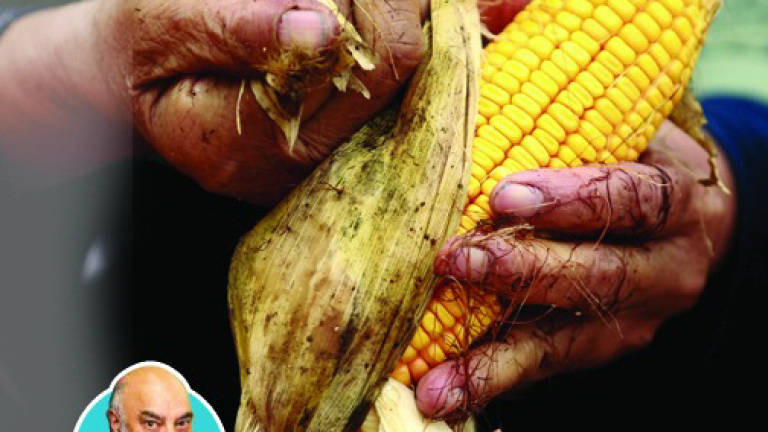Genetically modified food safe?

FARMERS have been modifying crops for millennia. They introduce new and desirable qualities to improve the food's taste, colour or smell; and eliminate unfavourable traits. All this has been done through conventional breeding – using selective breeding or artificial cross breeding of plants within a species.
Now there is modern biotechnology. It inserts new traits into plants and animals by "cutting" a specific gene from an organism (say a plant or animal) and "pasting" it onto another organism. Things that never happen in nature. For example, a particular fish gene can be introduced into a tomato to preserve its shelf life.
Loads of food crops have been thus modified. A common soil bacteria that produces toxins has been introduced into plants to make them resistant to insects or herbicide tolerant.
A large part of some crops produced in the US (and shipped overseas) are thus modified – soy, sugar beet, canola and corn (88%). Other crops include papaya, tomato and sweet potato. This makes it much easier to spray them with Monsanto's weed killer, glyphosate. There is a raging controversy over a probable causal link between exposure to glyphosate and cancer.
Consumers are concerned about adverse health impacts of eating these genetically modified (GM) foods, despite the producers' assurance that they are as safe to eat as non-GM food. Some big food retailers in the UK – like Sainsbury and Safeway – have pledged that none of their house brand products contain GM ingredients.
Last month, the European Parliament passed a resolution opposing plans to authorise imports of products made from GM herbicide-resistant maize and cotton. And it called for an overhaul of the EU's authorisation procedure for these genetically modified organisms (GMOs).
The position in Malaysia
Malaysia has approved GM soybeans and corn for human consumption. Lecithin (from soya) is used in a very large number of products that we consume – such as ice cream.
Malaysia imports GMOs, mainly from the US. Almost all of the feed for animals in Malaysia is genetically modified.
We are also experimenting to create GM crops – such as rice, papaya, bananas, pineapples and chillies; to resist virus infection, prolong shelf life, and delay ripening. We are also developing genetically-engineered oil palm to increase its beneficial oil content and create nutraceuticals (vitamin A and E); not quite into commercialising it for export yet, as European consumers oppose GM products.
Protection
We have enacted the Biosafety Act 2009 – to protect the environment and consumers from the health risks of GMOs and their products. Now any GMO intended for cultivation, contained use, field trials or consumption must be approved by the National Biosafety Board – assisted by an advisory committee. A large number of products have been approved.
In 2010, GM mosquitoes were released for field trials by the Institute of Medical Research to control dengue. The expectation was that the offspring of the GM mosquito would die before reaching adulthood. The plan was shelved shortly after – because, reportedly, its implementation was not cost effective.
Improvements
There remain several areas for biosafety improvement as highlighted in a recent Ministry of Natural Resources and Environment seminar.
First, GM products should be labelled – as mandated by the Act. So that consumers have the right to choose what they eat.
Second, the advisory committee – though doing a commendable best-effort work – must be beefed up with full-time professionals. Presently, they work part-time, in addition to their present heavy work-load. Besides the committee mainly assesses materials submitted by the industry. There is no independent verification or evaluation – as done by countries such as India.
Third, the committee should include civil society representatives to provide consumer perspectives.
Fourth, our laws on feed for animals must require disclosure of the possible GMO content of any imported GM feed – as required under the UN Cartagena Protocol.
Finally, we should explore non-GMO options before embarking on, what turned out in the case of the GM mosquitoes, to be a costly and wasteful project.
Industry measures
Commendably, the Federation of Malaysian Manufacturers has formulated best-practices to prevent non-GMO food crops from GMO contamination; from the selection of the seed for planting until the final crop reaches the consumer.
The measures include: ensuring that pure seeds are used for planting; the sowing machinery is free from any contamination and not co-mingled with GM seeds; maintaining an adequate distance and buffer zone from fields planted with GM crops – to avoid wind and insect-borne cross pollination contamination; cleaning thoroughly harvesting equipment; sealing harvested crops to reduce the risk of contamination as the products are transported through a number of operators in the supply chain; inspecting and cleaning the elevators (used to load the grains for storage); making sure the mills used are cleaned; and avoiding contamination at the processing stage of food and feed through careful monitoring by trained staff buttressed by an efficient raw material analysis.
These, however, are voluntary non-binding, industry guidelines. There is no official regulatory oversight for their enforcement.
Unfortunately, as a National Biosafety Board study showed, most Malaysians (88%) are not aware of GMOs, their potential impact and our biosafety regulations.
It is time then to address all these shortcomings. To ensure that our food chain is not contaminated; and our environment not adversely affected.
Comments: letters@thesundaily.com